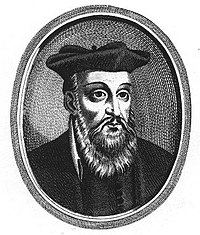
Jean Boulanger, a French line-engraver, son of the painter Olivier Boulanger and cousin to the painter of the same name, was born at Amiens in 1608 and baptized in Troyes in Champagne on 24 January 1608; he had five children with Marie Judon.[1] He was documented in Paris in 1645 and resided in the parish of Saint-Etienne-du-Mont.[2]
He seems to have attached himself at first to an imitation of the style of François de Poilly. An engraving, dated 1669-93, an impression of which is at the British Museum, representing the Holy Family with St John the Baptist, was engraved by Jean Boulanger and published by François de Poilly. The Ashmolean Museum possesses a drawing dated 1669-80 which corresponds very closely in style and composition to the just mentioned engraving and which has been recently identified as Boulanger's own invention rather than a drawing after another master.[3] He also engraved with François de Poilly a group of ornament drawings by Jean Cotelle the Elder (1607–76), which are part of the collection of the Ashmolean Museum, and which were published in Paris around 1647 with the title Livres de divers ornemens pour plafonds, cintres surbaissez, galleries et autres de l'invention de Jean Cotelle, Peintre Ordinaire du Roy.[4]
He later took up a mode of engraving similar to that of his contemporary Jean Morin, but which he greatly improved, of finishing the flesh and naked parts of his figures with dots, instead of strokes, or with a mixture of both. This gave a very soft and mellow effect; but as he finished the draperies and backgrounds with rather a harsh use of the graver, there was a want of union in the effect of his plates. Notwithstanding this defect, his prints have considerable merit, and are justly held in esteem.
He died in Amiens about 1680.[5]
- ^ Aceto, Angelamaria (2016). "A Rediscovered Drawing by Jean Boulanger (1608-c.1680)". Print Quarterly. XXXIII: 406–414 (406), citing documents discovered by Maxime Préaud in the Bibliothèque Nationale de France and the Archives Nationales, Paris.
- ^ Aceto, op. cit., p. 406.
- ^ Aceto, op. cit.
- ^ Aceto, op. cit., p. 413.
- ^ Aceto, op. cit., p. 306, citing a document in Archives Nationales, Paris, discovered by Maxime Préaud.